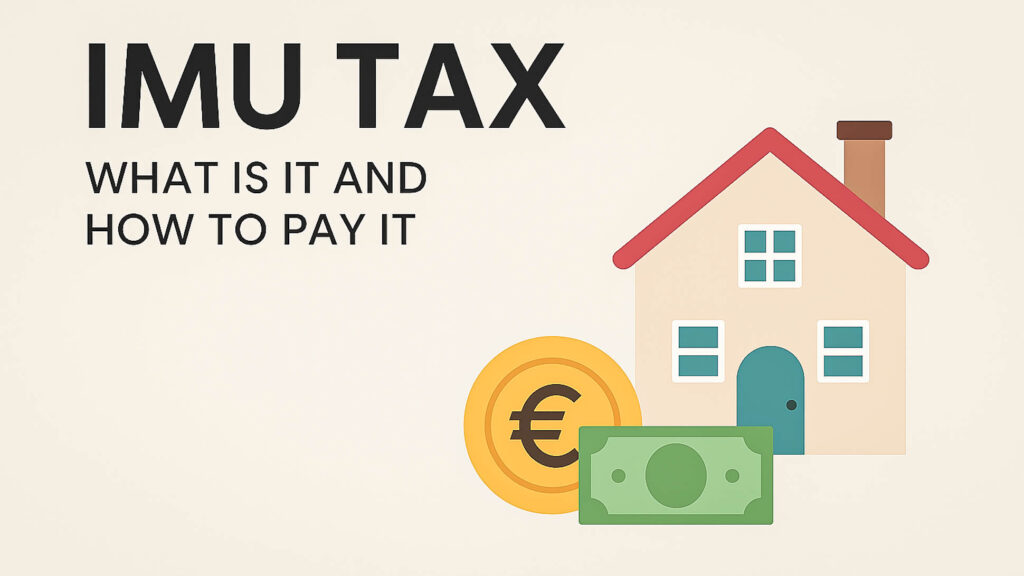
Owning property in Italy means facing a few recurring taxes. One of the most misunderstood is the IMU, a local property tax that surprises many foreign homeowners each year. IMU replaced an older, more extensive tax called ICI.
Whether you own a holiday home or inherited a family apartment, here’s how it works and how to pay it correctly.
👉 Related: Learn more about Navigating Italian bureaucracy and everyday life.
What is IMU?
IMU (Imposta Municipale Unica) is a municipal property tax in Italy. It applies mainly to second homes, luxury properties, and commercial buildings. Ordinary first homes (primary residences) are usually exempt, except in the case of high-value properties (e.g., luxury villas, castles, or historic residences classified as categoria catastale A1, A8, A9).
The tax is collected by the local municipality (Comune), and rates vary depending on location and property type.
In the Friuli Venezia Giulia region, and in the Trento and Bolzano provinces, different taxes apply instead of IMU. These are called respectively IMIS and IMI.
Who Has to Pay IMU?
- Owners of second homes in Italy.
- Owners of commercial properties (shops, offices, warehouses).
- Owners of land plots that are buildable (terreni edificabili).
- Non-residents who own a property in Italy that isn’t their main home.
✳️ Tip for foreign owners: even if you’re not an Italian resident, IMU is due on your property. If you’re a foreign buyer planning to use your Italian property only for vacations, IMU will likely apply. Make sure your codice fiscale is active. If in doubt, ask your accountant.
How Much is the IMU?
The calculation is based on:
- The cadastral value (rendita catastale) of the property, updated by coefficients set by law.
- The rate (aliquota) set by the Comune. Usually set between 7,6 and 8,6 per thousand.
- Any deductions or exemptions (for example, deductions for homes rented to direct family members, or agricultural land exemptions).
The IMU is calculated by taking the property’s cadastral value, increasing it by 5%, multiplying it by the cadastral coefficient, and then applying a tax rate of 8.6 per thousand.
There are many online IMU calculators. You can try this free one. However, for exact calculations it’s recommended to check with professionals.
Each Comune publishes its own rates and deadlines, so it’s important to check the local website or ask your commercialista (accountant).
When to Pay IMU
IMU is usually paid in two instalments:
- First installment (acconto): by June 16
- Second installment (saldo): by December 16
Some municipalities allow a single payment in June for the full amount.
How to Pay IMU
There are two main methods:
- PagoPA: The online platform that municipalities now use for tax and service payments.
- F24 Form: This is the standard Italian tax payment form. You can fill it online via your Italian bank, or at the post office (Poste Italiane).
Penalties for Late Payment
If you miss a deadline, penalties and interest apply. Knowing if you’re liable, when payments are due, and how to use the F24 or PagoPA system will help you avoid unnecessary fines. However, Italy allows for a “ravvedimento operoso” (voluntary correction) where you can pay late with reduced penalties if you act quickly.
Key Takeaways
IMU can seem confusing, especially because every Comune sets its own rules and rates. But once you understand the basics, paying it becomes a simple yearly routine.
In short:
- 🏠 IMU applies mainly to second homes, luxury properties, and commercial buildings.
- 💶 Primary residences are usually exempt, unless they are classified as luxury (A1, A8, A9).
- 📅 Payments are due twice a year — June 16 and December 16.
- 🧾 You can pay through F24 Form or PagoPA, both accepted online and at the post office.
- ⏰ If you miss a payment, you can still fix it through ravvedimento operoso (reduced penalties for late correction).
- 🌍 Foreign owners must also pay IMU if their Italian property isn’t their main residence.
